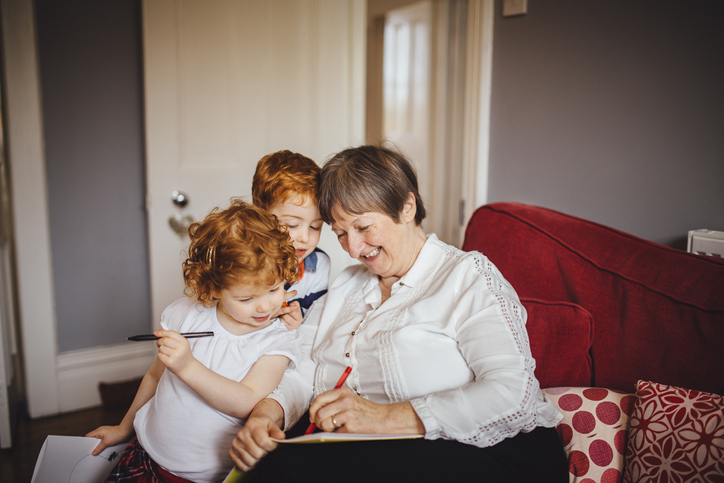Find out if you could be a foster carer
In a few simple questions, you’ll know if you’re suitable to apply to become a foster carer.
A long career as a nurse and midwife gave Moira first-hand experience of caring for babies who were addicted to drugs. Her time in the neonatal transitional care unit sparked a desire to care for such babies in a loving home environment rather than in hospital.
Moira and her husband, Graham began to consider fostering. They had friends who fostered and had seen for themselves the difference it makes to children. And they were in a position to do it with their three grown up daughters having left home, leaving them with plenty of space.
So, when Moira and Graham retired from their jobs nearly 10 years ago, they began the process of becoming approved as foster carers. It came as a surprise to their three grown up daughters who had expected their parents to kick back and relax in their retirement. But Moira, 69 and Graham, 71 were inspired by the idea of giving children a chance of a better start in life.
They applied to become foster carers with the National Fostering Agency South West. Their friends fostered with the agency and recommended them.
Graham explained: “We knew we didn’t want to foster with a Local Authority as we wanted a high level of support. With the agency, a supporting social worker is on call 24/7 so there is always someone there if you need it. And over the years we have needed it.”
Graham describes the approvals process as “extremely thorough”. He said: “They looked into our backgrounds and beliefs, the way we’d brought up our own children and how we were brought up, and why we were interested in fostering. If at any stage they’d felt we shouldn’t have been fostering, I think they’d have told us. The process began in July and finished in December and we attended a three-hour session most weeks. It was a cathartic process and felt very fair.”
Moira and Graham were approved in 2011. They chose to specialise in parent and child fostering after learning about this on the Skills to Foster course and completed a specialist Parent and Child Fostering course before taking their first placement.
In this type of fostering, both the parent and the children – often babies or very young children – stay with the foster carers and learn how to parent in a supportive family environment. This suits Moira and Graham as it enables them to use both their own parenting skills and Moira’s professional experience. It also means they can take regular breaks in between placements as most placements tend to be short – up to three months. Graham pointed out:
“Many of the parents haven’t been properly parented themselves so we often have to teach them the basics.”

Their first placement was a father with two young boys aged 18 months and two years, whose mother had failed a previous parent and child placement.
Moira said: “It was a baptism of fire for us as, sadly, the dad didn’t really have any idea how to care for his children. He was used to staying in bed until midday and being looked after by his mum. It came as a complete shock to have to bath and feed the children and he simply couldn’t manage it. Midway through the placement he left.
“We continued caring for the children until they moved to long term carers. We are still in touch with them and they are doing well. Now they are aged nine and 10.”
Although their first experience was intense and challenging, it served to confirm in their minds that parent and child fostering was what they wanted to do. Throughout the placement, they’d received great support from their supervising social worker who visited weekly and was always on the end of a phone, which gave them the confidence to continue.
Since then, Moira and Graham have had many different placements. Most of them have been mothers (ranging in age from 15 to 41) and children (ranging from the first child to the ninth). Graham said:
“We have worked with newborns who have come straight from the maternity ward with mum or with mum and dad, to mums with two toddlers. We had one year-long placement with three siblings aged three, eight and 11 and one placement with a 16 year-old college student”
Moira and Graham appreciate the training support that is offered by the agency and take every opportunity to do it. As time has gone on, they value being able to share their own fostering experience with newer foster carers and, prior to Covid, they were regular visitors to the local support groups. The couple also provides respite care and support to a nearby parent and child foster carer.
At the start of the pandemic, they took a short break from fostering as Graham needed to isolate due to his medical history. However, they have recently begun fostering again and currently have a mum and her three and four-year old children staying with them.

According to Moira, there are two measurements of success with this type of fostering.
She said: “In some cases, the parent does well and child goes home with them, which is always very rewarding. In other cases, the parent decides that they can’t do it and chooses to walk away, which means the children go up for adoption. It is good when the parents come to this decision by themselves rather than the decision being made for them. Ultimately, it is the outcomes for the children that matter the most.
“In many cases, we’ve cared for the children after their parents have decided to leave until they were adopted. Some of them are still in contact. In fact, we are Godparents to two of them and hear regularly from their adopted parents.”
Like all foster carers, Moira and Graham have experienced many highs and lows over the last 10 years.
A particularly low moment was when one couple decided, on the final weekend of their three month placement, that they couldn’t afford to keep their baby and wanted to put him up for adoption.
Graham said: “We were stunned. He was a lovely little boy. We had to pack up their stuff and drive them back to their home. The baby stayed with us for another five months before being adopted with two of his siblings, all of whom are autistic. The great thing is they have flourished under the care of their adoptive parents.”
On another occasion, Graham had to rush home from a Rugby match after a couple became abusive to Moira and left the placement with the child. Moira and Graham had to phone the police who were able to intercept the parents.
Moira said: “Any bad things that happen are mostly outweighed by the many really wonderful memories we have. It’s great to be able to help out these families and there are not many parent and child fostering placements. They give parents a chance to learn how to care for their children, rather than having them taken away.
“The challenge for many of these parents is that they haven’t been parented themselves so they are starting from ground zero. Sometimes they have learning difficulties which can make advising them difficult as they can’t always understand what you’re saying or why. Sometimes they are very oppositional and interpret what you’re saying as a criticism of them. Things tend to wax and wane during the placement – at times parents may be uncooperative and resentful but at other times they might enjoy being part of a normal family.”
Moira and Graham have discovered that having some background information about the parent and child before the placement, along with psychological and cognitive assessments can be helpful. He said: “These are relatively short placements so we don’t really have time to build up a clear picture of the parents. If we ask the Local Authority for this, they normally provide it and it can help us to understand how best to work with the individual.”
During a placement, Moira and Graham provide support with “anything and everything”, from helping with benefit applications, handling the baby, washing, feeding, changing and taking them to the doctor for jabs. The aim is that, by learning through watching in the first instance, the parent will gradually be able to take on these tasks for themselves, with Moira and Graham in more of a supportive role.
However, things don’t always go to plan and Moira admits it can become clear part way through a placement what the likely outcome will be. It is a complex process with many different people involved, including the supervising social worker and the child’s Local Authority social worker, the parent’s legal team, the child’s guardian (or advocate in the case of older children) and the courts.

Despite being in their late 60s and early 70s, Graham and Moira remain committed to parent and child fostering for several more years yet. They find it rewarding and are able to fit placements in around their lifestyle.
What do parent and child foster carers need? Plenty of patience and a “fairly thick skin” as they sometimes face abuse from people who don’t understand what they are trying to do.
Graham said: “I don’t think I could do this alone. Moira and I talk a lot about what’s happening and we do our daily logs. We discuss what we’re going to say each day. It would be tough to do it alone, although people do.”
Their advice to prospective foster carers is simple: “Do it. It is hard work and there are tough times but these are overridden by the joy of having children and helping children. I would recommend our fostering agency. Over the years they’ve been very fair and good to us and we’ve enjoyed working for them. The quality of the supervising social workers has always been good and the training is excellent.
“National Fostering Group is now the biggest in the UK so you never have to wait long for a placement. We don’t have to take every placement we’re offered, only those that are suitable for us and where we think we can make a difference.”
They added: “Foster children need love. They crave normality, security and attention and this is what they get with us, whether it’s tucking them in at night or giving them a cuddle.”
If Graham and Moira have made you curious, you can learn more about how to become a foster carer with National Fostering Group, or get in touch with your local team.